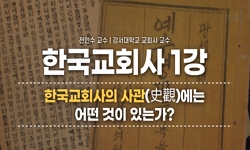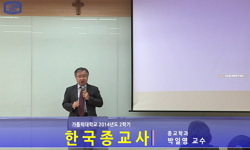지봉 이수광이 살던 시대는 16세기 전반부터 치열해지기 시작하여 후반기까지 정권 쟁탈전으로 동인과 서인으로 갈라지고 사회의 모순은 더욱 격화되어 갔다. 이러한 실학 배태기에 이수광...
http://chineseinput.net/에서 pinyin(병음)방식으로 중국어를 변환할 수 있습니다.
변환된 중국어를 복사하여 사용하시면 됩니다.
- 中文 을 입력하시려면 zhongwen을 입력하시고 space를누르시면됩니다.
- 北京 을 입력하시려면 beijing을 입력하시고 space를 누르시면 됩니다.
https://www.riss.kr/link?id=T15473101
- 저자
-
발행사항
공주: 공주대학교 일반대학원, 2020
-
학위논문사항
학위논문(석사)-- 공주대학교 일반대학원: 한문학과 2020. 2
-
발행연도
2020
-
작성언어
한국어
- 주제어
-
DDC
411.15 판사항(22)
-
발행국(도시)
충청남도
-
기타서명
A Study on Jibong Lee Su-Gwang's Silhak - Focus on 『De Deo Verax Disputatio』-
-
형태사항
62p; 26cm
-
일반주기명
지도교수:이동재
참고문헌 :58-59 p. -
UCI식별코드
I804:44004-000000029556
- 소장기관
-
0
상세조회 -
0
다운로드
부가정보
국문 초록 (Abstract)
지봉 이수광이 살던 시대는 16세기 전반부터 치열해지기 시작하여 후반기까지 정권 쟁탈전으로 동인과 서인으로 갈라지고 사회의 모순은 더욱 격화되어 갔다. 이러한 실학 배태기에 이수광은 사상적 업적을 남긴 뛰어난 사상가였다. 또한 성리학자들의 학문적 태도에 대한 비판을 하면서 실학자들의 박학적 학문 방법을 제시하였다.
이수광의 진보적이며 애국적인 사상과 나라의 부강과 발전을 도모하는 현실적 학문의 태도는 실학이라는 새로운 학문적 기풍을 마련하였고, 뿐만 아니라 부패한 봉건통치를 폭로하며 비판하고 개혁사상을 제기함으로써 실학이후의 발전 방향에 틀을 제시하였다. 사회적으로 혼란시기에 사신의 직분으로 세 차례나 북경을 다녀왔고, 그 곳에서 예수회소속 선교사로 있던 이탈리아 출신 마테오 리치(Matteo Ricci 利瑪竇)가 중국에 거주하며『천주실의』와 『곤여만국전도』를 지었는데 이수광은 이러한 서양문물을 기술하여 돌아와 그의 저서인 『지봉유설』을 통해 세계의 인식및 『천주실의』를 소개함으로써 조선에 처음으로 천주교에 관한 기록을 남기고, 실학사상에도 지대한 영향을 미쳤다고 볼 수 있다.
본 연구에서는 실학사상의 형성 배경과 이수광의 가계와 생애를 통해서 그의 사상이 조선인의 의식에 어떠한 영향을 주고 관직생활의 청렴함이 조선사회에 미친 영향력은 무엇인지 살펴보았다.
또한 그의 저서인『지봉유설』에서 그가 인식한 세계관을 살펴보았고, 『천주실의』가 조선에 미친 영향과 실학사상에 미친 영향은 무엇인지『지봉유설』과『지봉집』을 통해서 규명해 보았다.
그리고 실학자에게 미친 영향과 당시 실학자인 박지원, 박제가, 정약용이 서학서인『천주실의』를 수용하면서 그들이 제시하는 학문적인 실학 정신을 살펴보았으며, 실학사상사에 미친 의의는 무엇인지 그의 저서들을 중심으로 분석하여 시대적 상황 속에서 사회적으로나 학문적으로 실학에 미친 영향을 그들의 사상을 통해서 살펴보았다.
결국 지봉 이수광의 실학은 개화운동의 원류를 형성하는데 기여했으며, 그의 학문 및 인식 속에 융해되어 있던 것들이라고 볼 수 있다. 그리고 그의 인맥을 형성하는 실학자들이 대부분 천주교를 수용한 사람들이었다는 것을 알 수 있었다.
또한 이수광은 한국적인 민본사상의 출발점을 제공했으며, 기존의 성리학자들과 다른 관점을 가졌으며, 현실체계의 문제점을 그 근본에서부터 찾아내어 그 해결책을 제시하고 있다는 면에서 높이 평가될 수 있다고 본다. 그리고 그의 청렴한 공직생활은 오늘날 우리 시대의 표본이 된다고 볼 수 있다.
결론적으로 지봉 이수광은 다양한 사상을 포용하고 소통하려고 하였고, 조선 후기 실학사상에 새로운 활력소가 되었으며, 실천적이고 실용적인 학문에 기여한 인물로 평가될 수 있다고 보며, 급변하는 오늘날의 시대적인 상황 속에서 우리의 정체성을 확인하게 하는 계기를 주었다고 본다. 앞으로 그의 실학이 이 시대의 사상에 영향을 주는 인물로 많이 연구되어야 하고 그의 사상이 반영되어 ‘실사구시’를 실천하는 학문으로 연구 발전되기를 기대한다.
다국어 초록 (Multilingual Abstract)
Jibong Lee Su-gwang lived in the times when the power struggle, which began in the former half of the 16th century, became fierce in the latter part of the century and divided the factions into Dongins and Seoins with the social contradictions aggrava...
Jibong Lee Su-gwang lived in the times when the power struggle, which began in the former half of the 16th century, became fierce in the latter part of the century and divided the factions into Dongins and Seoins with the social contradictions aggravated even further. In this era of Silhak's germination, Lee Su-gwang left remarkable ideological achievements as an outstanding man of thought. He also criticized the academic attitude of Neo-Confucian scholars and proposed the well-informed academic approach of Silhak scholars.
His progressive and patriotic ideas and his realistic academic attitude of promoting the wealth, power and development of the country built a basis for the new academic ethos called Silhak. Furthermore, he disclosed and criticized the corrupt feudal rule and argued for reform ideas, building a framework for the directions of development after Silhak. When the country was in social confusion, he visited Beijing as an envoy three times. The Jesuit missionary Matteo Ricci from Italy lived in China and wrote De Deo Verax Disputatio and Kunyu Wanguo Quantu. After being exposed to this Western civilization, Lee wrote his Jibongyuseol back in Joseon and introduced the world perceptions and De Deo Verax Disputatio to the people of Joseon. He was the first person that left records about Christianity in Joseon and also had enormous impacts on Silhak ideas in the country.
This study set out to examine the backgrounds of Silhak ideas and Lee's family line and life and investigate the effects of his ideas on the consciousness of Joseon people and the impacts of his integrity in the public office on the Joseon society.
In addition, the study would examine his world views in his Jibongyuseol and investigate the effects of De Deo Verax Disputatio on Joseon and Silhak ideas based on his Jibongyuseol and Jibongjip.
In addition to impacts on Silhak scholars, the study also examined the academic Silhak spirits of Silhak scholars including Park Ji-won, Park Je-ga, and Jeong Yak-yong those days as they accepted a book of Western learning, De Deo Verax Disputatio. The study analyzed their significance in the history of Silhak ideas based on their books, understanding their social and academic impacts on Silhak in the situations of the times.
In the end, Lee's Silhak contributed to the origin of the enlightenment movement and was dissolved in his study and consciousness. Most of the Silhak scholars that were his personal connections accepted Christianity.
Lee also provided a starting point for the Korean-style democratic ideas, had different perspectives from the old Neo-Confucian scholars, and identified problems with the real system at its root and proposed their solutions, thus deserving high evaluation. In addition, his life of integrity in the public office offers an example for today.
In short, Jibong Lee Su-gwang tried to accept and communicate a variety of ideas, offered new vitality to the Silhak ideas in the latter part of Joseon, and contributed to the practical and pragmatic study. He offers a chance for modern people to check their identity in the rapidly changing situations of the times. His Silhak will hopefully benefit from more research efforts with him examined as a figure having impacts on the ideas of today and lead to the development of "pursuit of truth based on facts" with his ideas reflected in the process.
목차 (Table of Contents)
- 目 次
- Ⅰ. 緖論 ................................................................................................ 1
- Ⅱ. 實學思想의 形成 背景 .......................................................... 5
- 目 次
- Ⅰ. 緖論 ................................................................................................ 1
- Ⅱ. 實學思想의 形成 背景 .......................................................... 5
- 1. 實學思想 擡頭의 背景 .....................................................................5
- 2. 李睟光의 家系와 生涯 .................................................................10
- Ⅲ.『天主實義』가 朝鮮에 미친 影響 ............................... 23
- 1.『天主實義』의 紹介와 影響......................................................... 23
- 2. 實學思想에 미친 影響 ................................................................. 32
- Ⅳ. 李睟光의 實學史的 意義 ................................................... 40
- 1. 實學者에게 미친 意義................................................................... 40
- 2. 實學에 미친 意義 ......................................................................... 45
- Ⅴ. 結論 ................................................................................................ 52
- 參考文獻 ............................................................................................... 56
- ABSTRACT ..................................................................................... 59










